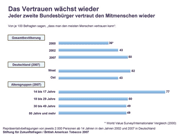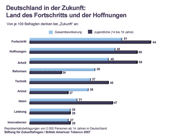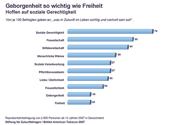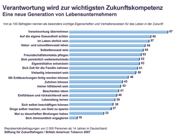Germans are in high spirits. The end of "German angst"!„
Foundation for Future Issues publishes study
about the future hopes of the Germans
World Cup and Oscars, G8 summit and EU presidency, falling unemployment and a growing economy: Is an end to German pessimism ("German angst") in sight? One in two Germans is now convinced that most people can be trusted again (2000: 361,000 – 2002: 431,000 – 2007: 501,000). Young people (771,000) place the greatest trust in their fellow citizens, which offers hope for the future. This is according to a representative study on the "Hopes for the Future of Germans," in which the Foundation for Future Issues, an initiative of British American Tobacco, surveyed 2,000 people aged 14 and over in Germany.
Professor Dr. Horst W. Opaschowski, the scientific director of the newly founded Future Foundation, which continues the work of the former BAT Leisure Research Institute, said: „Heinrich Heine’s famous saying, ‚When I think of Germany at night, I am robbed of sleep,’ is now taking a positive turn. Hope for the future and belief in progress are no longer mutually exclusive. For Germans, the future once again means: getting ahead – professionally and personally.’
Germany in the future:
Land of progress and hopes
Germany is a land of many faces. In this land of ideas, innovation, and achievement, young people, in particular, see their hopes for the future realized. For them, the future primarily means progress (641 TW – total population: 511 TW). Young people aged 14 to 19 remain convinced that work has a future (581 TW – total population: 451 TW). For most young people, the future is another word for hope (581 TW – total population: 481 TW). Families with children (521 TW) or teenagers (551 TW) in the household also look to the future with more hope than retirees (461 TW) or single people (391 TW). Professor Opaschowski: „Young people believe in the future. They can and should dream about the future. And they also have enough time over the course of their lives to revise their vision of the future if necessary.“
Germans' visions of the future oscillate between optimism and realism, which is why the risk of poverty is not ignored and the viability of reforms is viewed critically. Overall, however, an optimistic outlook on life prevails. And the almost oppressive fear of the future seen in recent years is giving way to a more positive sense of certainty.
Security is as important as freedom.
Hoping for social justice
A shift in values with a positive direction is emerging. At its core are prosocial values aimed at a harmonious coexistence of people. These include helpfulness (64%) and human warmth (59%), friendship (66%) and social justice (74%). And for every second German citizen (49%), security is once again just as important as freedom (49%). These are the population's answers to the question, "What should be important and valuable in the future?"„
Opaschowski: „Citizens desire an end to the looming social erosion and are quite ready for a moral renewal, which includes a revaluation of the importance of social justice.“ Surprisingly, social justice tops the list of Germans' wishes for the future – for West Germans (75%) just as much as for East Germans (74%). On this issue, there are hardly any differences between the various professional, social, and age groups. The population is signaling an urgent need for political action in this area. At the same time, the outlines of a culture of helping others are emerging for the future, one that may soon make us forget the age of self-centeredness.
Responsibility is becoming the most important skill for the future.
If the German people have their way, the future will be an era of responsibility. The most important future skill, for example for raising children, is the ability to take responsibility (67%). Families with teenagers rate responsibility for themselves, for others, and for the environment particularly highly (77%). Anyone who wants to start a family and be successful in their career must be willing and able to take on this responsibility. "The guiding principle of a 'Generation Responsibility' is emerging for the future, a generation that is self-aware and conscientious, environmentally conscious, develops initiative, and cultivates relationships," says Professor Opaschowski.
Such an idealized vision of life may have existed in the past. However, what is new, given the ever-increasing life expectancy, is the future competency of "taking care of one's own health" (58%). Those who neglect this are inadequately prepared for life in the future. Maintaining physical, mental, and social health and fitness well into old age, so as not to be a burden on others, will be the fundamental prerequisite for any kind of life planning. And this applies not only to the private sphere. Those who disregard their own health when planning their professional careers are simply acting unprofessionally and will not get far in their careers. Social responsibility begins with personal responsibility. Only in this way can tomorrow be better than today.
Sources of supply
The documentary „Trust. Freedom. Progress. The future hopes of the Germans“ can be obtained from the Foundation for Future Issues.






